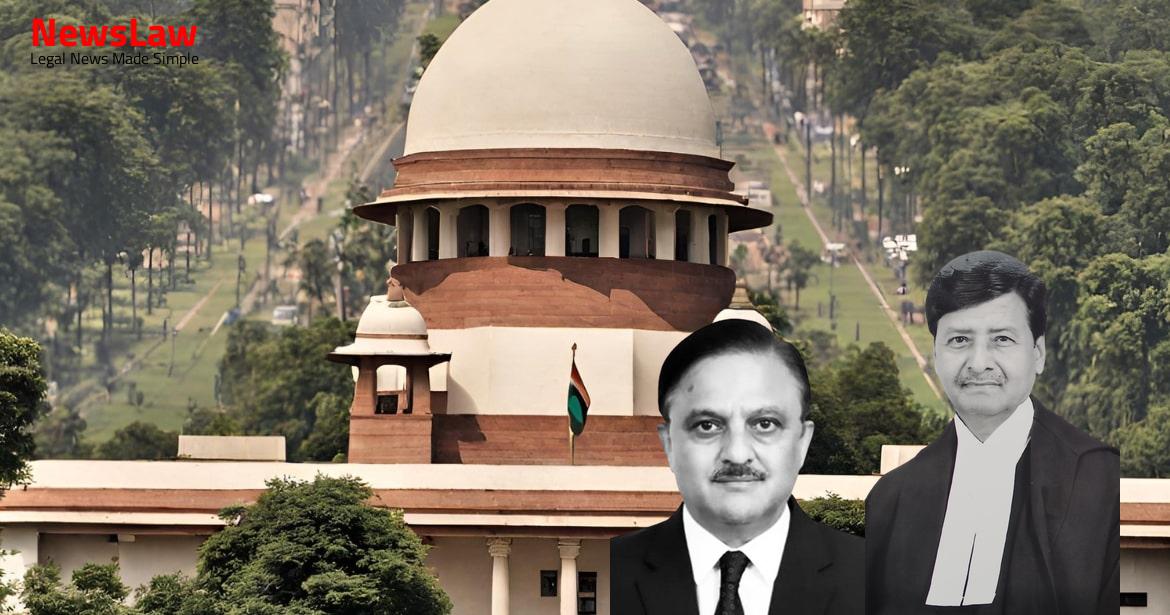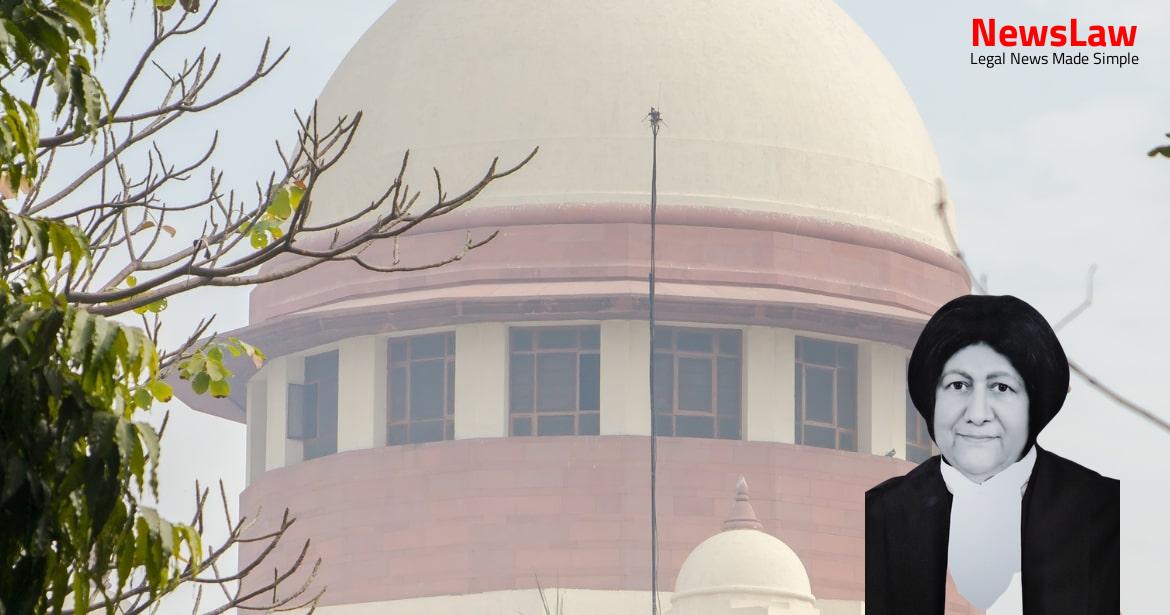The Supreme Court, in a significant ruling related to the resolution process of Jaypee Infratech Ltd., prioritized stakeholder interests and addressed key concerns to facilitate a fair outcome. The judgment aimed at resolving confusion and delays in the Corporate Insolvency Resolution Process, ensuring justice for all parties involved. Find out more about the implications of this landmark decision!
Facts
- The Home Buyers’ Association filed an application before the NCLT seeking clarification on the voting percentage of allottees.
- The matter was referred to the President of the NCLT due to a difference of opinion among members, who then passed an order on 24 May, 2019.
- Jaypee Green Krescent House Buyers Welfare Association challenged the order dated 24 May, 2019.
- Permission was granted to file an appeal before the NCLAT in Company Appeal (AT)(INS) No.708 of 2019.
- The order directed the constitution of a CoC afresh, invited fresh expressions of interest for resolution plans, and made JIL/JAL ineligible to participate in the CIRP.
- The appeals were related to the CIRP of Jaypee Infratech Ltd. and were disposed of by the NCLAT through a common judgment and order on 30 July, 2019.
- IDBI Bank filed application under Section 7 of I&B Code against JIL as it turned NPA.
- Writ petitions by home buyers concerning JIL project disposed of on 9 August, 2018.
- Directions issued by Court in Chitra Sharma & Ors. vs Union of India & Ors. case.
- IDBI Bank sought relief to exclude certain period for counting 270 days in Corporate Resolution Process.
- NCLAT granted relief as per IDBI Bank’s request and issued consequential directions.
Also Read: Balancing Justice: Case Summary of C.P. No. 16/2017
Issue
- The NCLAT had to determine if it had the power or authority to exclude 90 days from the statutory period of the CIRP.
- Various grounds and circumstances were listed where the intervening period could be excluded for counting the total 270 days of the resolution process.
- The Allottees Association filed an application seeking liquidation of Jaypee Infratech Ltd. as they believed the 270 days had expired.
- The NCLAT had to decide whether, despite the rejection of resolution plans by CoC, it could start the CIRP afresh by excluding 90 days and inviting revised resolution plans.
- The NCLAT considered the interest of the Allottees as the primary importance in the Corporate Insolvency Resolution Process.
Also Read: Judgment by Supreme Court of India in M/s. Bhilwara Processors Ltd. vs. Department of Central Excise
Analysis
- The Court is conscious of the fact that adopting the course indicated in the impugned judgment may modify the directions given in a previous case, Chitra Sharma, regarding the time limit for the conclusion of the Corporate Insolvency Resolution Process (CIRP) for JIL.
- The case presented an extraordinary situation due to confusion over foundational processes and lack of clarity, leading to litigation and delay in resolution.
- Legislative amendments have expanded the scope of resolution plans to include restructuring options and prioritization of creditors.
- The Court emphasizes the importance of adhering to the statutory timelines and stipulations specified in the Insolvency and Bankruptcy Code (I&B Code) while exercising judicial powers.
- The Court refrains from appointing a Committee to oversee the resolution process under the IBC, as it may conflict with legislative mechanisms and the need for expert determination in corporate insolvencies.
- There was uncertainty in resolving critical issues like vote share computation for the Committee of Creditors, leading to varied interpretations and delays in decision-making.
- The judgment endeavors to salvage the situation by recommencing the resolution process afresh and renewing the timeframe for completion to prevent liquidation of JIL.
- An attempt is made to provide a viable solution acceptable to all stakeholders, particularly the substantial number of home buyers affected by the case.
- The judgment emphasizes the need to avoid liquidation and find a resolution that serves the interests of all involved.
- The Court uses plenary powers under Article 142 to facilitate the resolution process and ensure justice while refraining from inviting fresh resolution plans to prevent further delays.
- Several parties expressed concerns and doubts about the process, leading to a complex situation requiring careful consideration and resolution.
- Jaiprakash Associates Ltd. (JAL) has appealed against the judgment.
- JIL is a subsidiary of JAL.
- Wish Town Home Buyers Welfare Society, a home buyers’ Association, has also filed an appeal.
- No liberty is given to Jaiprakash Associates Ltd., based on the Supreme Court’s decision in ‘Chitra Sharma’
- The impugned order dated May 24th, 2019, is not interfered with.
- The orders in C.A. No.115 of 2019 and C.P. No. (IB) 77/ALD/2017 are declared infructuous.
- The appeals are disposed of with the observations and directions given.
- The Supreme Court’s principles in the cases of ‘Arcelormittal India Private Limited vs. Satish Kumar Gupta & Ors.’ and ‘Chitra Sharma’ have been followed.
- The period from September 17th, 2018 to June 4th, 2019 (total 260 days) is excluded for counting the 270 days.
- Insolvency resolution process of a corporate debtor must be completed within 90 days from the date of the court order.
- The period for completion of the resolution process starts from the date of the court order, not from the commencement of the Insolvency and Bankruptcy Code (Amendment) Act, 2019.
- Directions are issued under Article 142 of the Constitution of India to all concerned parties to adhere to the 90-day timeline from the date of the court order.
Also Read: Landmark Judgment: Consolidation of FIRs and Bail Granted in ‘Grand Venice’ Project Case
Decision
- The second phase of 45 days starting from 21 December, 2019, allows margin for addressing difficulties and passing appropriate orders by the Adjudicating Authority.
- The Interim Resolution Professional (IRP) is instructed to proceed with the resolution plan process without being impeded by any other pending applications before NCLT or NCLAT.
- The deadline for completing the Corporate Insolvency Resolution Process (CIRP) for JIL is set at 90 days from the date of the order.
- During the initial 45 days, only Suraksha Realty and NBCC are permitted to submit revised resolution plans, which will then be presented to the Committee of Creditors (CoC) after negotiations.
Case Title: CHITRA SHARMA Vs. UNION OF INDIA SECRETARY MINISTRY OF FINANCE
Case Number: MA-001122 / 2019



